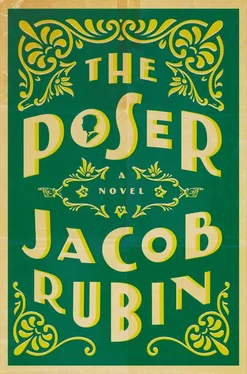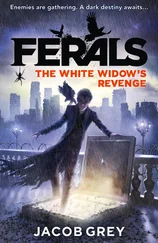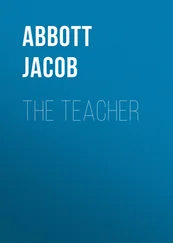Apache, of course, was shackled and thrown into the brig. “They were gonna hang his ass,” Max said, but a host of beguiling particulars emerged, complicating what had seemed such bald betrayal. To start, the rear admiral often furnished the Japanese officer with incorrect data on troop strength, giving credence to the theory, harbored by some members of the tribunal, that Apache had been recruited from some other arm of government to perform extraintelligence work as a “mock mole” or “counterspy,” winning the trust of the Japanese commander in order to prey on the man’s extramilitary sense of honor. How Apache had won, let alone maintained, the credulity of a blind-hearted enemy was a subject of great speculation. Some believed he and Ozu had cemented a real friendship despite whatever games of betrayals had passed between them. Others that Apache had journeyed so far into being a spy he no longer knew what he stood for. Apache answered none of the tribunal’s questions.
In the end, the rear admiral’s fluency in Japanese, his keeping a handwritten facsimile of the correspondence, meticulously ordered and dated in the valise under his cot, his skill in prosecuting such communiqués from the secure distance of an aircraft carrier, and his extraction of valuable intelligence from the Japanese officer (as well as the secret intervention, it was widely believed, of higher-ups in the government) saved Apache from execution. He was discharged without punishment, though many in the navy still called for his head. To his few staunch champions, however, Apache was a maverick patriot, a genius of war and other things.
“Finnegan said there were rumors,” Max told me. “That he was still doing spy work. That the theaters he owned were just a front. But this—” He snapped open the paper with a businessman’s panache.
According to the Gazette , Apache had purchased the old Tinder Box Theater, a half mile west of Aberdeen Row, the heart of bohemia. “‘The relic of the building remains in Western Downtown on Fourteenth Avenue,’” Max read, as our cabdriver nosed toward the Fourteenth Avenue exit ramp, “‘an anomaly among the warehouses and meat-packing plants that have since sprung up around it. Renovating the Tinder has remained a cause célèbre among the more quixotic and nostalgic of the city’s philanthropists, but was considered foolhardy, if not impossible, given the reestablishment of the Theater District two miles north of what is now an industrial neighborhood. The nightlife and ne’er-do-wells of Aberdeen Row are close enough, this is true, but the theater will need more than a bohemian audience to maintain its costs. And what would draw faithful theatergoers from their velvet-lined boxes in midtown to a rickety cabaret so far west?’
“Apache can do it if anyone can,” Max said, as the driver jolted to obey a stop sign and then peeled right onto a potholed street, stopping when we came to a redbrick building. “He once said to me, ‘Max, if you’re good at killing in wartime, you’ll be good at turning profit in peace.’ This guy’s got something, boy.” According to the article, Apache, outside of basic renovations, planned to make no structural changes to the building. But he was giving it a new name. It would now be known as the Communiqué.
• • •
Bookending the entrance were two copper-topped bars where men glared at us like deer. Many circular tables, chairs stacked on top of them, filled the space leading to the stage itself, between which hunched sweepers busily worked. On the stage an unoccupied ladder stood under a massive dangling light rig. It smelled like sawdust and beer.
“Is Bernard Apache here?” Maximilian addressed no one so much as the hall itself. The sweepers stopped their work to consider us. The bar hands, a few feet away, continued to peer in our direction as if incapable of speech. Max stepped forward, and I followed, both of us coming out from under the low ceiling, which, we saw now, supported a grand balcony glutted with red-cushioned seats. An illuminated box indicated a second bar above. “Is Bernard Apache here?”
Again, silence.
“Is Bernard Apach—”
“Who wants to know?”
The voice hailed from the far end of the room. Through the forest of upturned chair legs, a plume of smoke rose, like a signal in the woods, and we made our way toward it, around the sweepers. As we approached, we saw four wiry men in suits sitting around a table, playing poker, all of them vigorously chewing gum — producing a street-firecracker chaos of pops and snaps —except the oldest, a man in his early fifties maybe, who held between his middle and ring fingers a cigarette from which he extracted long, vulnerable sips. His pale blue eyes — amused, I would call them — did not stray from his hand of cards, despite this arrival of strangers, us. His tablemates, meanwhile, greeted Max and me with a uniform glower and even more hostile jawing of gum.
“Who you?” asked the man next to the cigarette smoker. This one, like the other three, wore a pinstripe suit. He had a thin, hideously tanned face, gap teeth and a lightning-shaped vein now flashing in his forehead.
“Mr. Apache, hello,” Max said to the older man, but he didn’t look up from his cards.
“Who wants to know?” the tanned one asked. He ground his gum between the words, creating out of each syllable a discrete phrase.
“But Mr. Apache, hello.” Still, Apache, if it was him, didn’t respond. He must have gone deaf, been someone else.
“Who wants to know?” the other said, rising.
“Maximilian Horatio.”
As soon as Max said his name, the older man smiled in a grand lying way, the way politicians smile when presented with a gift on television — the kind of smile that respects size over verisimilitude. The man laid down his cards, stood, and opened his arms. That was the first thing I noticed about Bernard Apache, the man who would ruin my life: He had banished all impulse from his body.
“Maximilian Horatio.” He hugged Max, patting his back twice, and then held him at arm’s length, taking him in. He was nearly Max’s height but lank with broad shoulders and moved, generally, with a lightness, a physical grace evident even in his stillness, like the pose of a magician before a trick. “Long time.”
“Too long, Mr. Apache. Too long! I trust you’ve been well?”
Apache said, “Call me Bernard.”
“All right then, Bernard,” Max said, anxious to establish levity. “How you been for godsakes?”
Apache ignored this and instead made a show of looking at me. He wore a brown suit, a black bolo tie, and cowboy boots.
“Bernard, meet Giovanni Bernini,” Maximilian said.
Apache nodded shortly and turned back to Max. “So. Why are you here?”
“Serendipity, if I ever seen it, Bernard! Here I am trying to decide where to go with this new act — I’m getting offers uptown, downtown, but, y’know how it is, none of them feel right —and that’s when I happen upon this”—he had produced the Gazette from his pocket, snapping it against the palm of his hand—“about your taking over the Tinder, and, well, it’s a match made in heaven, you ask me.”
Apache casually removed some stray tobacco from his tongue. “Is this person talented with something?”
Max paused for effect. “A master impressionist!”
“Good to see you. Stay well.”
“Wait, wait!” He chased Apache with mincing, diplomatic steps.
“I know what you’re thinking, impressionist — please, I go out on the street and find twenty just taking a shit. But this kid—”
“Take care of yourself, Max.”
“He can do anyone.” Max snapped his fingers. “Like that.”
Читать дальше












